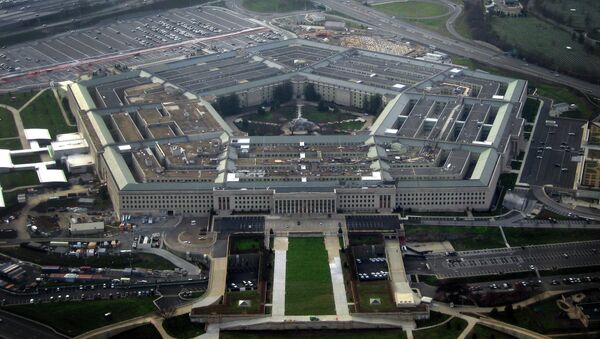WASHINGTON, December 31 (Sputnik) – Washington and NATO are not seeking confrontation with Russia, but will not compromise on international principles vital for European and US security, Pentagon spokesperson Lt. Col. Vanessa Hillman told Sputnik commenting on Russia's revised military doctrine.
"The United States is reviewing Russia's new military doctrine. Neither the United States nor our NATO allies are a threat to Russia, and for more than two decades, NATO worked to build a partnership with Russia. The United States and its NATO allies do not seek confrontation with Russia," Hillman said on Tuesday.
The spokesperson noted that Russia's alleged actions in Ukraine challenged US vision of the peace in Europe, and stressed the importance of adherence to the Minsk agreements by all parties involved.
"It is incumbent upon Russia to comply with international law and its international obligations and responsibilities. We will not compromise on the rules-based international order and principles on which security in Europe and North America rest, of which NATO is a key component," Hillman stated.
The West and Kiev are accusing Russia of providing aid to pro-independence forces in eastern Ukraine and even of a direct military intervention in Ukraine. Moscow has dismissed the accusations as groundless.
The new doctrine, signed by Russian President Vladimir Putin on December 26, highlighted NATO's military build-up and the bloc's expansion toward the Russian borders among the main external threats to the national security.
Furthermore, for the first time ever the doctrine named the protection of national interests in the Arctic among the main priorities for Russian armed forces in times of peace.
Hillman noted that the United States has a clear interest in preserving stability, security and cooperation in the Arctic, as outlined in the US National Strategy for the Arctic Region.
"The Arctic is a harsh environment that rewards cooperation, not confrontation. And I trust we will continue to see cooperation there as we work with the other Arctic nations on shared concerns, such as search and rescue and oil spill response preparedness," she said.
Other external threats listed in the doctrine include the development and deployment of strategic missile defense systems, the implementation of the 'global strike' doctrine, plans to place weapons in space as well as the deployment of high-precision conventional weapons systems.
According to the document, Moscow reserves the right to use nuclear weapons in response to the use of nuclear weapons or any other types of weapons of mass destruction against Russia or its allies, as well as in the case of an attack with conventional weaponry that threatens the existence of the state.
Among the main internal threats, the document listed "activities aimed at destabilizing the situation in the country", terrorist activities to harm sovereignty and territorial integrity of Russia, and actions involving anti-patriotic propaganda.
Russia's military doctrine remains purely defensive in nature, the document emphasized.

